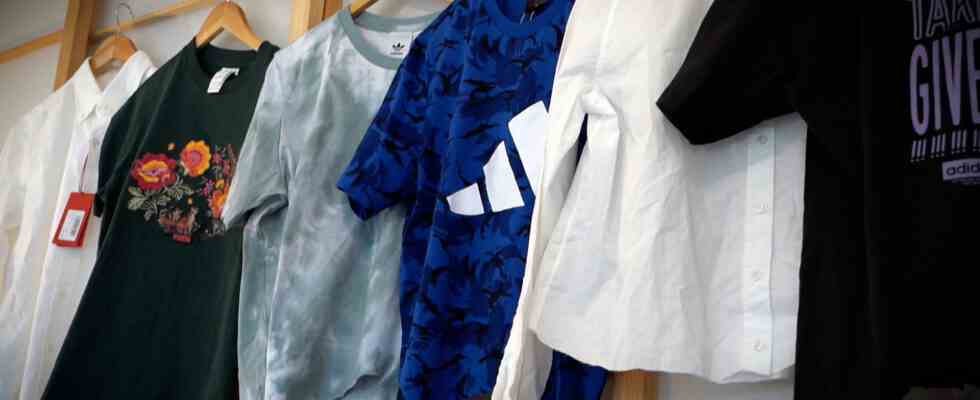Exclusive
Status: 05/05/2022 4:00 p.m
Adidas, Hugo Boss, Puma and other German textile companies are selling according to research CTRL_F apparently further goods containing cotton from the Chinese region of Xinjiang. People are forced to work there.
Scars on the wrists, head and back are the silent witnesses of the martyrdom Erbaqyt Otarbai endured. The 46-year-old says he was imprisoned for months in the Chinese region of Xinjiang and was restrained, beaten and tortured with electric shocks during this time: “Once they took me into the shower room and shocked me with electric tasers.”
Otarbai was later taken from prison to a labor camp and made to sew clothes there. “It was very strenuous work,” he recalls. He didn’t have a choice: “Anyone who didn’t do a good job was sent back to prison. And nobody wanted to go back there.”
Erbaqyt Otarbai had to sew clothes in a labor camp.
Image: CTRL_F
Suspicion of systematic forced labor
It is reports like these that have brought suspicion of cotton and textile products from Xinjiang being systematic forced labor – and because of this, German companies have also claimed that they no longer purchase products from the Chinese provinces. But research by CTRL_F suggest that clothing from German brands such as adidas, Hugo Boss, Puma and Jack Wolfskin could still contain cotton from Xinjiang.
Key to this research is the analysis of the isotopes found in cotton products. They form a pattern that reveals which part of the world the material comes from. In cooperation with the Agroisolab in Jülich and the Niederrhein University of Applied Sciences, the research team used this method for the first time to determine the origin of cotton in clothing. With clear results: The researchers found evidence of cotton from Xinjiang in T-shirts from Puma and adidas, shirts from Hugo Boss and Jack Wolfskin and a pullover from Tom Tailor.
Ethnic minorities particularly affected
The research shows how German companies can potentially benefit from the exploitation of ethnic minorities in Xinjiang in particular. Because the reports of eyewitnesses like Otarbai are an expression of systematic oppression. “In Xinjiang, there is a very large prison industry – that is, prisons and companies that cooperate with them and thus get cheap labor,” explains Rune Steenberg, who researches the situation of the Muslim Uyghur minority in Xinjiang. He reports a drastic increase in prison sentences: “Between 2013 and 2018, the number of people imprisoned every year increased almost tenfold.”
An assessment shared by Wang Leizhang*. The former Chinese policeman knows the system of oppression. There is already a threat of violence during the arrest, as well as during interrogation. “Whoever falls asleep will be beaten,” says Wang. After the arrest, there is a threat of forced labor: “In all prisons, inmates are forced to work, and the operators make money from it.”
forced labor or prison
Forced labor is also documented in Xinjiang’s cotton fields. Almost 90 percent of Chinese cotton is produced there, which is around a fifth of global production. Under what circumstances, reports the cotton farmer Eyüp Enwer*. In some cases, up to 20 percent of the inhabitants of a village were sent to forced labor, and the number increased from year to year. “Harvesting cotton for eight to ten hours is hard work,” says Eyüp. “You can’t sit, spend the day bent over, your back hurts.”
Anyone who refuses faces imprisonment. “I saw how 175 Uyghurs were taken to a camp because they didn’t want to harvest – they got between five and 15 years in prison for it.” Hand picking is particularly important for long-fiber cotton, which grows primarily in southern Xinjiang, where many Uyghurs live. This cotton, especially in organic quality, is considered valuable and is mainly exported to the West – and in the end apparently also ends up in clothing from adidas, Hugo Boss, Puma, Jack Wolfskin and Tom Tailor.
Still a lot of manual work required
The Chinese government denies the allegation of forced labor. This is impossible on the plantations because almost all of the cotton is harvested with the help of machines. Therefore, the research team, in cooperation with the company Vertical 52, examined the agricultural areas of Xinjiang by satellite. The results show that around a third of the harvest was recently picked by hand. According to a method developed specifically for this research, it is even around half in southern Xinjiang.
Manufacturers deny allegations
When asked, the manufacturers maintained their claim that they did not source any cotton from Xinjiang. Adidas said in writing that it only purchases cotton from other countries. Puma stated: “Based on all the information we have gathered and the traceability and controls we have in place, we can say that no Xinjiang cotton is used in our products.”
Hugo Boss stated that it would not tolerate forced labor in its supply chains and maintained its statement that it does not source any goods directly from Xinjiang. Jack Wolfskin did not address the issue of Xinjiang cotton in their supply chains, but emphasized that they do not tolerate forced labor. Despite repeated requests, Tom Tailor has not commented.
But the supply chains in China are difficult for companies to control, says an auditor who has been checking supplier companies in China for years. He speaks exclusively but anonymously to the research team out of fear for his Chinese employees: “It is theoretically possible, but highly unlikely, that Western companies can actually say with certainty that there is no forced labor in their cotton supply chains in Xinjiang.” Because: No audit company can currently work independently in Xinjiang.
* Names changed
Broadcast note: Panorama reports on this topic tonight at 9:45 p.m. on ARD

